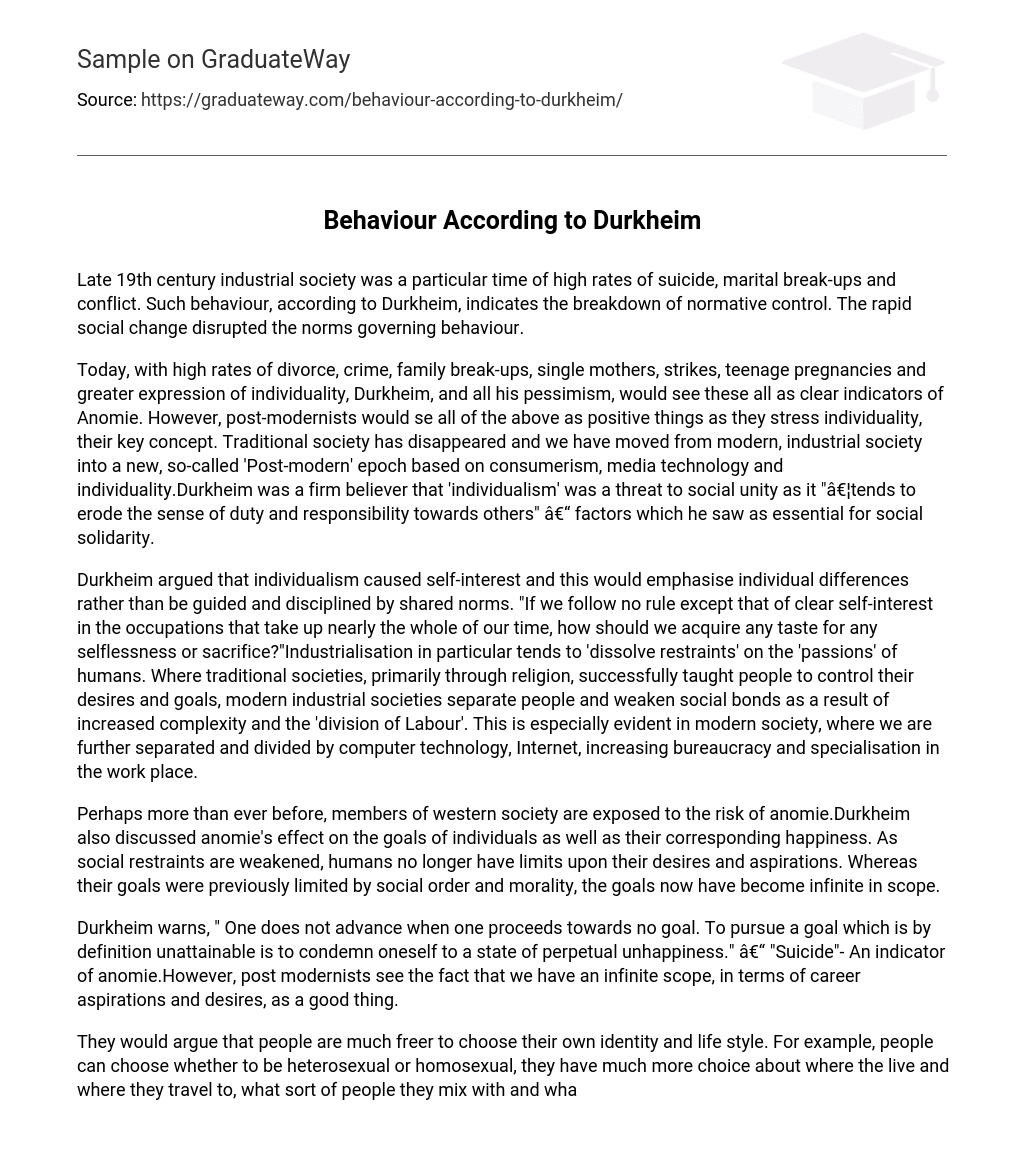Late 19th century industrial society was a particular time of high rates of suicide, marital break-ups and conflict. Such behaviour, according to Durkheim, indicates the breakdown of normative control. The rapid social change disrupted the norms governing behaviour.
Today, with high rates of divorce, crime, family break-ups, single mothers, strikes, teenage pregnancies and greater expression of individuality, Durkheim, and all his pessimism, would see these all as clear indicators of Anomie. However, post-modernists would se all of the above as positive things as they stress individuality, their key concept. Traditional society has disappeared and we have moved from modern, industrial society into a new, so-called ‘Post-modern’ epoch based on consumerism, media technology and individuality.Durkheim was a firm believer that ‘individualism’ was a threat to social unity as it “…tends to erode the sense of duty and responsibility towards others” – factors which he saw as essential for social solidarity.
Durkheim argued that individualism caused self-interest and this would emphasise individual differences rather than be guided and disciplined by shared norms. “If we follow no rule except that of clear self-interest in the occupations that take up nearly the whole of our time, how should we acquire any taste for any selflessness or sacrifice?”Industrialisation in particular tends to ‘dissolve restraints’ on the ‘passions’ of humans. Where traditional societies, primarily through religion, successfully taught people to control their desires and goals, modern industrial societies separate people and weaken social bonds as a result of increased complexity and the ‘division of Labour’. This is especially evident in modern society, where we are further separated and divided by computer technology, Internet, increasing bureaucracy and specialisation in the work place.
Perhaps more than ever before, members of western society are exposed to the risk of anomie.Durkheim also discussed anomie’s effect on the goals of individuals as well as their corresponding happiness. As social restraints are weakened, humans no longer have limits upon their desires and aspirations. Whereas their goals were previously limited by social order and morality, the goals now have become infinite in scope.
Durkheim warns, ” One does not advance when one proceeds towards no goal. To pursue a goal which is by definition unattainable is to condemn oneself to a state of perpetual unhappiness.” – “Suicide”- An indicator of anomie.However, post modernists see the fact that we have an infinite scope, in terms of career aspirations and desires, as a good thing.
They would argue that people are much freer to choose their own identity and life style. For example, people can choose whether to be heterosexual or homosexual, they have much more choice about where the live and where they travel to, what sort of people they mix with and what clothes they wear. The boundaries between social groups are breaking down and you can no longer predict the sorts of life styles people will adopt. Post modernists believe that because so much choice exists, many of the aspects studied by ‘modern’ sociologists are no longer important and no longer useful.
Some Post modernists question the belief that there is any solid foundation for producing knowledge about society. They believe that there is no one and could never be one single valid theory on sociology. There is no truth. From their perspective, all knowledge is based upon the use of language.
Language can never describe the external world perfectly. Knowledge is essentially subjective – it expresses personal viewpoints, which can never be proved to be correct.Post modernists such as Jean Baudrillard argue that it has become increasingly difficult to separate media images from anything even reminiscent to reality. Society has become so “saturated with media images” that people now confuse, for example, media characters with real life.
An example of this occurred when some viewers launched a campaign to free Deirdrie Rashid a character from Coronation Street from prison.Baudrillard also believed in the theme that there has been a ‘super abundance’ of signs. He argued that because of developments in the media and culture, we are now just consumers, not necessary objects but signs and symbols. These grow as time goes on, increasing our confusion to the point where we are unable to differentiate between reality and fiction.
He calls this ‘Hyper – Reality’White believes that the explosion of new technology is seen as instruments that empower people. He also agues that for some they are ‘the instrument of an emerging Big Brother’ or a potent new ideological apparatus of corporate capitalism. Both of these views acknowledge that new technologies have enormous power to structure the ‘ideas and self identity’ of individuals and groups. Although decentralising advances in technology may well provide opportunities for enhancing individual control over everyday life, much of the information technology will continue to be linked to large institutions thereby enhancing ideological control over dominant groups.
It remains to be seen which segments of society are systematically advantaged or disadvantaged. This raises the question of power, ideology, freedom and justice.Post-modernism draws upon critiques of the increasingly bureaucratic and controlling nature of society. It tends towards “anarchic calls to celebrate chaos” and to live for the moment, because there is now no ultimate purpose in life.
Rationality is not really appropriate in this day and age.While popular in sociology as abstract and fashionable, post-modernism has also been incredibly unpopular with others where it is seen as a form of “Conservatism”. This is the view of Habermas, whose project to reformulate the notion of rationality is based on the idea that it is still possible, a view clearly at odds with Post-modernism. He suggests that there might still be some basis for rational and critical thinking.
Ernest Gellner and Habermas represent this option – return to the roots of reason. Proclaim universality is once more alive and capable of instantiating reason in the worldTaylor — finds in the modern ideal of authenticity – of clinging to the self”s commitment to being true – a hope for the future.





